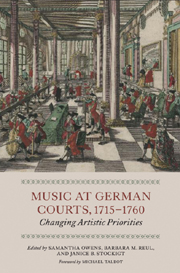Book contents
- Frontmatter
- Contents
- List of Tables
- Foreword
- Preface
- Editorial Notes
- Notes on Contributors
- List of Abbreviations
- 1 ‘Das gantze Corpus derer musicirenden Personen’: An Introduction to German Hofkapellen
- KINGDOMS AND ELECTORATES
- DUCHIES
- 6 The Court of Württemberg-Stuttgart
- 7 The Court of Saxony-Gotha-Altenburg
- 8 The Courts of Saxony-Weißenfels, Saxony-Merseburg, and Saxony-Zeitz
- PRINCIPALITIES AND PRINCE-BISHOPRICS
- LANDGRAVIATES AND MARGRAVIATES
- Index
8 - The Courts of Saxony-Weißenfels, Saxony-Merseburg, and Saxony-Zeitz
from DUCHIES
Published online by Cambridge University Press: 12 September 2012
- Frontmatter
- Contents
- List of Tables
- Foreword
- Preface
- Editorial Notes
- Notes on Contributors
- List of Abbreviations
- 1 ‘Das gantze Corpus derer musicirenden Personen’: An Introduction to German Hofkapellen
- KINGDOMS AND ELECTORATES
- DUCHIES
- 6 The Court of Württemberg-Stuttgart
- 7 The Court of Saxony-Gotha-Altenburg
- 8 The Courts of Saxony-Weißenfels, Saxony-Merseburg, and Saxony-Zeitz
- PRINCIPALITIES AND PRINCE-BISHOPRICS
- LANDGRAVIATES AND MARGRAVIATES
- Index
Summary
OVER 350 YEARS AGO on 1 May 1657, in accordance with a directive in the will of Elector Johann Georg I (1585–1656), the three duchies of Saxony-Weißenfels, Saxony-Merseburg, and Saxony-Zeitz were established for the collateral lines of the Albertine-Saxony dynasty in order to provide for the sons born after the actual successor (see the genealogical overview in Table 8.1, p. 250 below): the so-called secundogeniture principalities. At that time, Dukes August of Saxony-Weißenfels (1614–1680), Christian of Saxony-Merseburg (1615–1691), and Moritz of Saxony-Zeitz (1619–1681) each received small portions of the electorate of Saxony to govern autonomously for their own economic benefit. Their first-born brother, Elector Johann Georg II of Saxony (1613–1680), who resided in Dresden, inherited not only the largest part of the territory, but also retained supremacy over the whole of Saxony (including those areas left to his brothers) in legal and military matters, as well as foreign policy. Thus the secundogeniture dukes received only a restricted sovereignty; that is, they held the genuine rights of rulers, and governed territories, without actually possessing them. Their estates continued to suffer from the consequences of the devastating Thirty Years' War: the populations of towns and villages were decimated, administrative structures either had not been re-established or were completely rebuilt, and the region's economic base – founded mainly on agriculture and trade – was meagre.
- Type
- Chapter
- Information
- Music at German Courts, 1715–1760Changing Artistic Priorities, pp. 223 - 256Publisher: Boydell & BrewerPrint publication year: 2011



